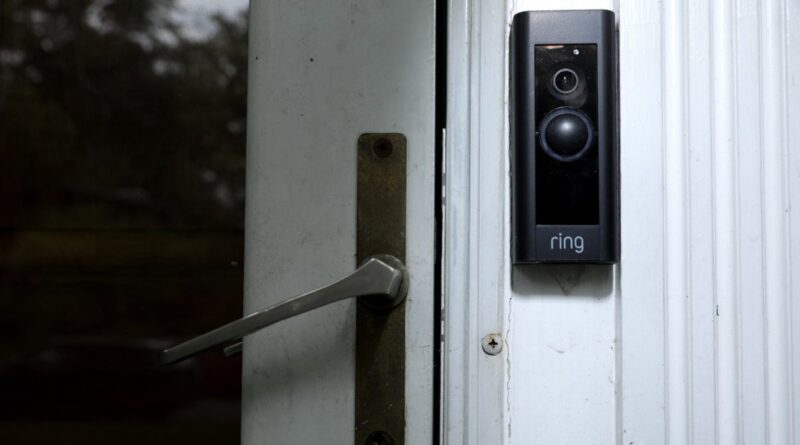Ring Tells Senator: No, We Won’t Enhance Doorbell’s Privacy

Ring is rejecting the request of a U.S. senator to introduce privacy-enhancing changes to its flagship doorbell video camera after product testing showed the device capable of recording conversations well beyond the doorsteps of its many millions of customers. Security and privacy experts expressed alarm at the quality of the distant recordings, raising concerns about the potential for blackmail, stalking, and other forms of invasion.
In a letter to the company last month, Sen. Ed Markey, a Democrat of Massachusetts, said Ring was capturing “significant amounts of audio on private and public property adjacent to dwellings with Ring doorbells,” putting the right to “assemble, move, and converse without being tracked” at risk.
Markey did not asked the company to adjust the range of the device, but adjust the doorbell’s settings so audio wouldn’t be recorded by default. Ring, which was acquired by retail giant Amazon in 2018, rejected the idea, arguing that doing so would be a “negative experience” for customers, who might easily get confused by the settings “in an emergency situation.” What’s more, Ring appeared to reject a request never to link the devices to voice recognition software, offering only that it hasn’t done so thus far.
Experts such as Matthew Guariglia, a policy analyst at the Electronic Frontier Foundation, have said the device is particularly harmful to the privacy of individuals who live in close quarters — think apartment buildings and condos — where they may be unknowingly recorded the moment they open their doors.
Ring also disclosed in its response to Markey that it’s made copies of customer videos available to police on 11 occasions this year based on “emergency” request. It’s not clear how many times police attempted to obtaining footage citing exigent circumstances.
The company told Politico — which first reported on Ring’s response to Markey — that it notifies users whenever it receives warrants for their footage. Police can obtain court orders under certain circumstances, however, that prevent companies from disclosing that information.
Emails obtained by Gizmodo in 2019 showed that Ring had assembled a “subpoena team” that worked to advise police seeking access to footage without the consent of its users. (The name is an apparent misnomer, as the company claims a subpoena is not sufficient to obtain access to content, i.e., video footage or audio recordings, without a valid court order.)
Jay Stanley, a senior policy analyst at the American Civil Liberties Union, said the practice is commonplace at tech companies. The businesses often see the benefit of guiding police through the subpoena process, he said, rather than be forced to repeatedly reject requests that are improperly submitted.
Ring said it cooperates with subpoenas — which do not require probable cause that a crime has been committed — only after making a “good-faith determination” that failing to do so would risk imminent death or serious physical harm. Data obtainable with a subpoena ostensibly includes customer details such as a name, address, and billing information, as well as details about a particular recording, commonly known as metadata.
A bi-annual report published by Ring show the company received over 2,600 search warrant requests and more than 2,700 preservation requests from government sources in 2021 alone. This is in addition to around 400 subpoena requests. Fewer than half of all the requests were content-related. It’s unclear how often Ring attempts to challenge government demands.
Ring has previously claimed that police are unable to access footage unless it’s supplied directly by customers, though that policy applies strictly to the company’s crime-alert app, Neighbors. That promise does not extend to government demands and other binding legal orders, such as preservation requests, which may require the company to retain records of personal data, even when customers seek its deletion.
Neighbors, which has millions of users, is advertised as a way to receive “real-time crime and safety alerts” from local law enforcement and other users nearby. Controversially, Ring has sought out partnerships with thousands of U.S. police departments, offering them access to a special platform through which customers can be directly contacted.
Officers using the Neighbors platform are able to solicit footage by selected a date, time, and location. Users with corresponding footage are notified of the requests. Ring says departments aren’t notified when users decline to help.
No fewer than 2,1oo agencies are currently signed up, which, as Markey noted, is five times as many compared to 2019.
Ring, which recently saw an increase in subscription prices, said it recently implemented more than 100 changes to its products following an audit by researchers from New York University School of Law studying the device’s impact on civil liberties.
Among the changes, the company said it introduced new transparency measures in response to questions raised by the auditors regarding its willingness to hand over user data.
Ring also said its made efforts to reduce the chance of content on Neighbors being used for racial profiling, adding staff to moderate content before it’s uploaded. In 2019, Gizmodo examined more than 65,000 posts shared by Ring users across the app. More than 830 posts explicitly mentioned skin color. More than two-thirds contained references to individuals perceived to be Black.
The company has refused to commit fully to encryption, saying such “advanced features may not be right for all customers.” What’s more, Markey pointed out that the company previously declined to say if it would ever introduce facial recognition.
“It has become increasingly difficult for the public to move, assemble, and converse in public without being tracked and recorded,” Markey said, advocating for the passage of the Facial Recognition and Biometric Technology Moratorium Act, a bill designed to impose limits on law enforcement’s collection of biometric data and use of technology such as facial recognition.
Additional reporting by Dell Cameron.

